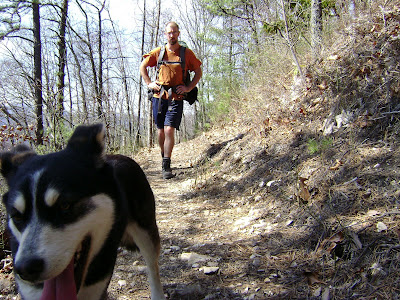

I first learned of the Appalachian Trail from the book, A Walk in the Woods by travel writer Bill Bryson, who attempted to hike all 2,175-miles of it from Georgia to Maine. Bryson didn’t just fail—he failed miserably—only completing a fraction of the trail. While judgments may rightfully be made about his outdoorsmanship, anyone who can make shitting in your pants sound as poetic as he does is okay in my book:
“What on earth would I do if four bears came into my camp? Why, I would die, of course. Literally shit myself lifeless. I would blow my sphincter out my backside like one of those unrolling paper streamers you get at children's parties--I daresay it would even give a merry toot--and bleed to a messy death in my sleeping bag."
My friend Luke, hailing from South Carolina—who I used to work with in Coldfoot—asked me to join him and his dog, Rimsky, on a 78-mile trek along the trail for spring break. Feeling a bit insulated after months spent alone in the van, I enthusiastically agreed to join him.
I always did, however, find something off-putting about hiking on trails. If one goes into nature for adventure and self-discovery, how can one discover anything when every step you take and every sight you see is determined by those who blazed the trail? How can you test yourself in nature when a trail is made to circumvent the very challenges nature presents?
Putting these questions aside, Luke and I began our hike just west of Asheville, NC where we’d set off north along the North Carolina-Tennessee border. We decided to do about fifteen miles a day, which we thought would be challenging, yet feasible. While Luke and I plodded on with a good 40 pounds on our backs, Rimsky ran circles around us, never concerned about conserving energy.

As the days wore on, though, Luke’s body deteriorated. First there was a blister on his foot. Then his knee started acting up. When his ankle began bothering him, Luke looked less like the arctic dog-musher that I once knew, and more like a zombie, dragging his feet with each step, that you can’t wait to gun-down in a videogame. He soldiered on though, and because of his tenacity, we were able to make it to the trail shelter each night.
Every ten miles or so there are lean-tos, or three-sided cabins. Luke and I opted to spend our nights sleeping under the stars, but when it rained we were forced under the lean-to. After spending a night in one, Bryson’s friend, Katz, said “There’s nothing like a good night’s sleep and that was nothing like a good night’s sleep.” Katz was preoccupied with the mice that commonly terrorize hikers at AT-shelters and I, too—I’m afraid to admit—cowered in my sleeping bag late into the night, nervously eyeing the walls which—from the sounds of it—seemed like a bustling metropolis of the little bastards.

At the shelters we met several “thru-hikers”—a term used for those who intend to walk the entire trail--which typically takes up to six months to accomplish (though only 29 percent have the mettle to make it all the way).
One night we came across a hiker in his fifties named Hillbilly who was trying to hike up to Connecticut, but decided he was going to call it quits at the next road because his rattled body couldn’t take it anymore. His face reminded me of the drivers who’d pick me up on my hitchhikes. Beneath a mat of grizzled hair was a battered face aged prematurely by calamitous relationships, manual labor, and whiskey.
A relic of the 60’s, Hillbilly didn’t evolve with his contemporaries who got a job, a family and a 401K. No; Hillbilly, content in a set of perforated jeans, faded shirt and a lifestyle defined by drugs, free love, and contempt for authority, never shed his skin. What were once the ideals of a free-spirit were now no more than bad habits, bad decisions, and a chronic and self-inflicted case of “down-on-my-luck” syndrome. There was something sadly anachronistic about him; no longer the free-loving spirit of his glory days, he looked worn-out now—as if he would have been better off not to have dragged his past with him.
He didn’t belong on this trail, I thought. Go clean up, get a job and leave it for the younger generations who have something to prove. Escaping to nature will not solve your problems. These mountains, this lifestyle, has nothing to give you anymore.
Luke and I ended up falling short of our goal as well, stopping at mile 69 on account of Luke’s leg. And without any death-defying moments, run-ins with bears, (or shitting in our sleeping bags for that matter), I found myself thinking about Hillbilly after our trip more than anything else. Bryson’s tale, too, is in large part a tale of his interactions with fellow hikers. I suppose that’s because a trail doesn’t just connect people to nature; it connects people to people.
When you’re on the Appalachian Trail and see nothing but tall pines and rolling hills, it’s easy to delude yourself into believing that you’re hiking in something close to pure wilderness. But just over the next hill and through the wall of trees are the staples of civilization that are never more than a day’s walk away. It would be silly to write-off the AT simply because it’s not pure. No wilderness, of course, is completely pure. Man has been built for nature and nature, in some cases, I think, is okay when built for man. The value in nature—I realize—isn’t always in the challenge it presents, but in the remedial qualities that only nature—of any shape or size—can bestow.
